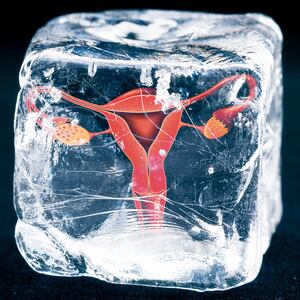For H. Alan Scott, a 36-year-old comedy writer based in Los Angeles, the trouble began when he noticed a pain in his “lower region.” At the time, in 2012, Scott was training for a marathon and figured it was an injury he sustained during a run. But when the pain persisted, Scott went to the doctor to rule out something serious. After a blood test, an ultrasound, a physical exam and a biopsy, Scott's worst fears were confirmed: he had Stage 2 testicular cancer.
“When you get diagnosed you have to very quickly deal with things,” Scott said. In the whirlwind three weeks between his biopsy and the start of chemotherapy treatments, Scott received counseling on what to expect during his treatment, and the long-term effects it might have on his body—including his fertility.
“One of the main things [the counselor] stressed was that the type of chemo I was getting could adversely affect my sperm count,” Scott recalled. “I was 30, I was a comedy writer, so I wasn't really thinking about having kids. But I didn't not want that option someday.”
Scott quickly decided to freeze and bank his sperm for possible future use, opting for a medical facility near his mother's home in Saint Louis so she “could be near the grandkids.” While there are no statistics currently on how many men choose to freeze their sperm, experts say the process, called cryopreservation, is only getting more popular.
“As more individuals and same-sex couples have the desire to have children, there will be a growing demand for cryopreservation,” said Dr. Clay Mechlin, a physician with the Urology Associates of Central Missouri.
Typically, cryopreservation takes place in a urologist's office. The patient is tested for STIs, blood infections, and sperm health to determine if cryopreservation is a “viable option,” Mechlin says. Once the results are in, men are asked to provide a sperm sample through masturbation, either at home or in-office. Sperm is then preserved in multiple vials, mixed with a cryoprotectant, and frozen in sub-zero temperatures until later use. Studies show that sperm can be used successfully for conception even 40 years after freezing. Patients who elect to freeze their sperm usually pay an initial consultation fee and then a monthly or annual fee for as long as they wish to store their sample. Scott, whose testicular cancer is in remission and who is still undecided on having children, pays $500 annually to store his sperm.
Emily Hurdle, a 25-year-old trans woman living in Pittsburgh, decided to freeze her sperm in 2018 before starting hormone replacement therapy (HRT). Because HRT has a tendency to cause sterility in trans women, Hurdle, like Scott, wanted to preserve her sample in case she wanted biological children at some point in the future.
“I can't really speak to why freezing sperm is becoming more common with cis men, but for trans women it just makes sense,” Hurdle said. “HRT can make you permanently sterile, and I'm not planning on having my testicles forever anyway. I figured it's better to have the option.”
Hurdle opted to freeze three samples with a private sperm bank called CryoChoice, at a price of $149 per kit. As a result, Hurdle will be spending $450 every year to preserve her sperm until she decides to use them or have the sperm bank dispose of them. In addition to the $450 yearly fee, Hurdle also paid $1500 for the initial fee.
Although Hurdle chose to provide her sample at home and mail it into CryoChoice via FedEx delivery, not all cryopreservation labs provide that option. When Scott provided his sperm sample at a hospital in Saint Louis, he describes the experience as “awkward.”
“I went to the hospital and the nurse had the same name as my mother and she looked just like my mother,” Scott said. “Which is the last thing you want to have happen.” Producing the sample was more difficult than he expected as well, said Scott, between the nurse who looked like his mother, the early-morning hours they asked him to come in, and the fact that he couldn't get phone service in the hospital room. With CNN blaring on the hospital TV, Scott eventually provided the sample and went on his way.
Since more people are opting to preserve their sperm, startup companies are rushing to create a cheaper, more user-friendly experience. One company, called Legacy, which provides home-based collection kits and remote sperm storage, announced earlier this month that it secured $1.5M in seed funding from Bain Capital Ventures, an asset management company headquartered in Palo Alto, CA. Another cryopreservation startup, Dadi, has acquired $2M in funding since January 2019. The CEO of Dadi, Tom Smith, said Dadi has already serviced members “into the thousands” in the 14 weeks since their launch, with customers spanning in age from 17 to 70.
According to Smith, the cultural trend toward sperm freezing is something that's long overdue.
“In today's society the only opportunity a man has to know if there's a problem is when they try to get someone pregnant and they can't,” Smith said. “It's unfortunate because the earlier you can identify if there's a problem, the sooner you can try to improve that outcome. Now, men are being more proactive.”
Additionally, Smith says, men are now more keenly aware, thanks to research, that men over the age of 45 have a higher likelihood of passing on genetic defects or putting their partner at risk for birth complications. They're also more concerned about mortality, Smith says. “We find that some [Dadi customers] work dangerous jobs, like military or police force, and they want to bank sperm in case something happens.”
Joseph English, a 39-year-old product designer from Boston, opted to freeze his sperm with Dadi after discussing the effects of hormonal birth control with his girlfriend.
“We started talking about alternatives to condoms and looking into options, and she told me about her previous history with IUDs and hormonal birth control,” English recalled. “It just sounded terrifying. I didn't like the idea of her having cycles that were hard on her body or doing something that might affect her physiology.” Although the two are happily child-free at the moment, English thinks that's likely to change within the next five years.
English also wanted to look toward the future in a “responsible way,” he said. “Professionally, I'm in a brutal field with a lot of 90-hour workweeks. I know that can have an impact on trying to get pregnant and have kids, so I wanted something more foolproof than just relying on my own aging body.”
For a one-time $99 fee, Dadi shipped an insulated box to English's house, complete with a receptacle, a built-in preservative, and pre-paid postage. Once English's sperm was deposited in the receptacle and mixed with the preservative to survive the mailing process, English elected to preserve his sperm for a $99 annual fee—substantially cheaper than traditional models of sperm banking thanks to low overhead costs, Smith said.
“It's a fundamental changing of the model,” Smith said. “We can service the entire country, as opposed to a sperm bank based in Denver that can only service people in Denver.”
As couples delay having children, as sperm counts continue to decrease thanks to obesity and malnutrition, and as sperm freezing becomes steadily more democratized, it's clear that cryopreservation is here to stay.








